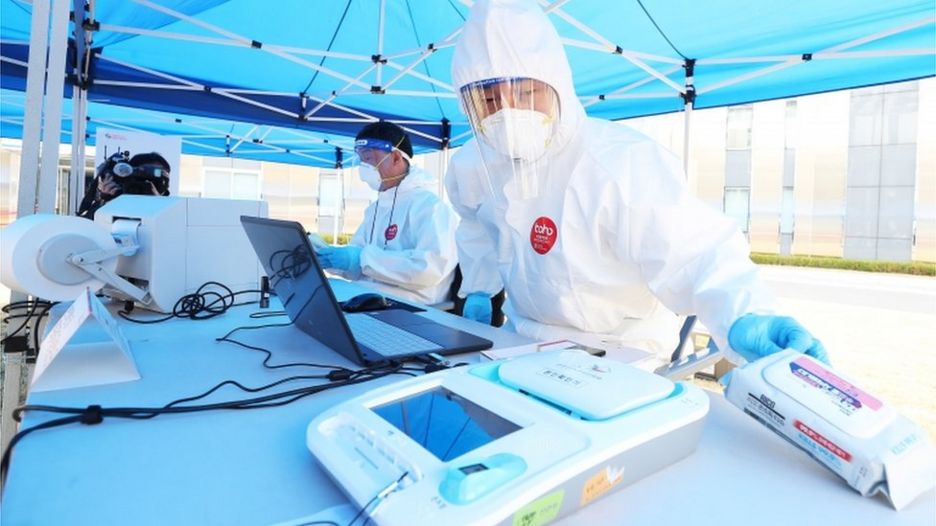 Image copyright EPA
Image copyright EPA South Korea is holding an election unlike any other.
Voters must come wearing masks and stand at least 1m apart. They will have their temperature taken, disinfect their hands and wear plastic gloves.
Only then will they be given their voting slip and be allowed to head into the booth to cast their ballot.
These are just some of the measures being taken to allow the scheduled National Assembly election to take place during the Covid-19 pandemic.
Three hundred seats at the National Assembly being contested. Thirty-five parties have registered candidates, but the race will be between the ruling Minjoo (Democratic) Party and the main opposition, the conservative United Future Party.
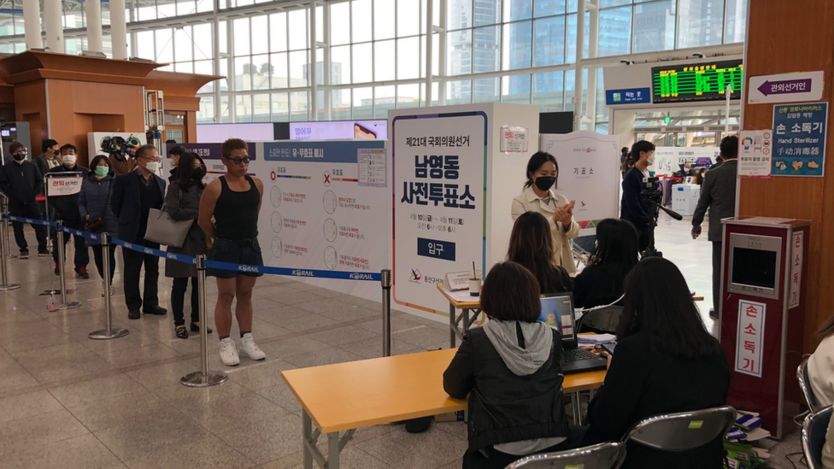
The government's handling of the coronavirus outbreak has dominated all discussions during this election. It has eclipsed fears of a struggling economy and a number of corruption scandals involving presidential aides.
The National Assembly elections are seen as a bit of springboard to test candidates and party popularity ahead of the presidential elections in 2022
'Our right to vote'
Some critics feared it would be chaos. Instead, all I observed on the days of early voting was calm.
People quietly stood in line at the designated mark, patiently waiting their turn.
"I thought maybe the election should be postponed because people wouldn't turn up," one young female voter told us. "But now that I'm here and see so many others, I'm not worried."
- The country teaching empty classrooms
- Why some countries wear face masks and others don't
- What can the West learn from Asia's coronavirus fight?
The fear of infection doesn't appear to be keeping people away.
More than 11 million people, about 26% of the population, have cast their votes in advance. Some by post, but most travelled to early polling stations which were set up around the country on Friday and Saturday.
It's been a record early turnout. It's also the first time that 18-year-olds have been allowed to vote. We met a number of them at Seoul Station all excited to take part. The pandemic has not put them off.
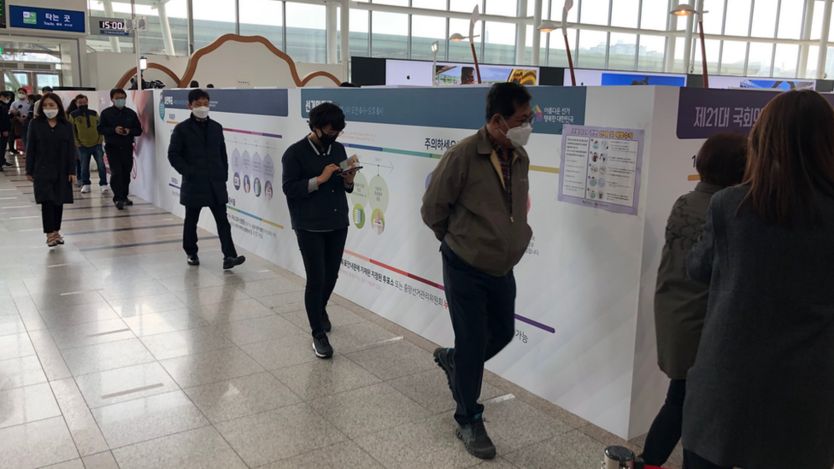
"This is about our right to vote," said one waiting in line.
"Voting is something we must do," said another first-time voter. She admitted that the plastic gloves were a little bit "inconvenient" but they made her feel safe.
Voting from quarantine in clinics
South Korea has never postponed an election. Even during the Korean War in 1952, the presidential elections went ahead.
The challenge for officials was how to avoid the risk of infection.
They decided that if someone has a temperature above 37.5C, they would be taken to a separate voting area and kept separate from other people.
Patients being treated for coronavirus were given the option of mailing their ballot.
But polling booths have also been set up outside residential centres which care for hundreds of people with mild symptoms. We watched as one woman in a mask emerged from a facility in her hospital gown and was handed her ballot by staff in full protective clothing.
The booth is outside to help prevent the spread of infection.
"At first thought I couldn't vote and I was disappointed," she told the news agency Reuters. "But once I heard we would be able to vote as well I was thankful for this opportunity."
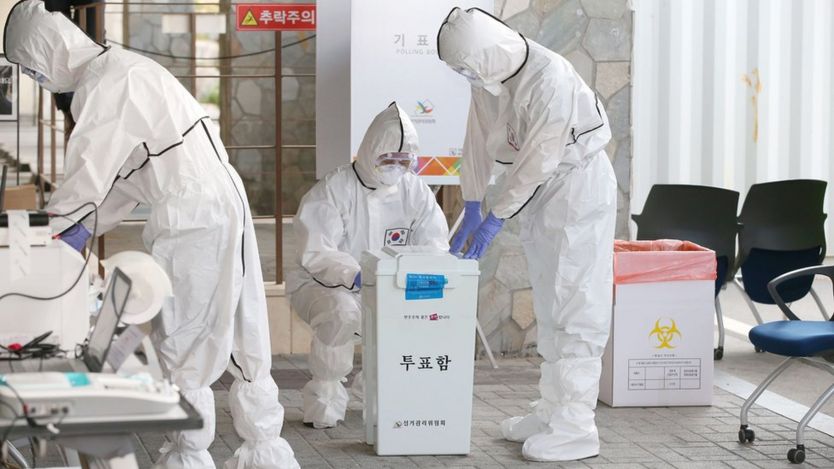
One of the biggest issues has been how to allow the 60,000 people in quarantine across the country to head to the polls.
They are under strict instructions to only vote at certain times and in designated polling stations. They can leave their homes from 5.20pm until 7pm on the day of polling, they can't use public transport and can only walk or use their own car. They then must call health officials when they return to their homes, otherwise, we have been told, police officers will be despatched to find them.
A number of people have already broken quarantine rules in South Korea in the last month which is why the authorities are monitoring this so closely.
- A SIMPLE GUIDE: How do I protect myself?
- AVOIDING CONTACT: The rules on self-isolation and exercise
- HOPE AND LOSS: Your coronavirus stories
- VIDEO: The 20-second hand wash
- STRESS: How to look after your mental health
Army of staff
It has taken an army of 550,000 staff to prepare the polling booths and ensure things go smoothly on election day. They've disinfected about 14,000 voting stations and marked lines so queuing voters avoid standing too close to one another.
It all takes a bit more time and effort, but it seems most people are happy to put up with the short delay for the sake of democracy.
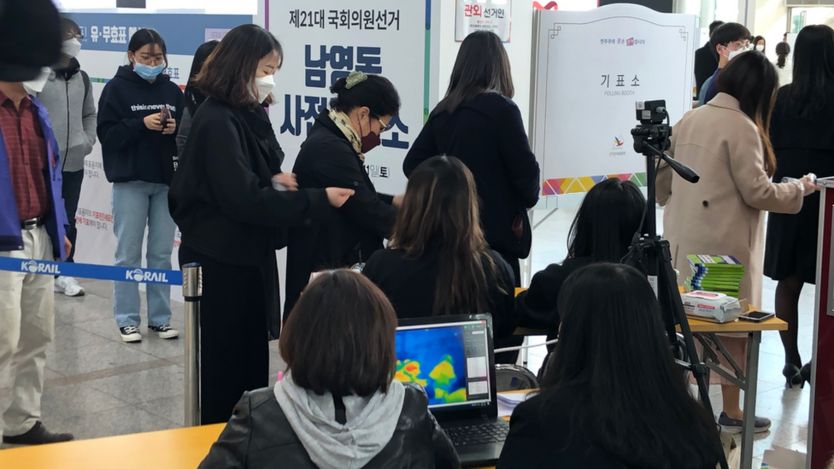
"Everyone recognised the seriousness of the situation and showed mature citizenship by encouraging electoral officials rather than complaining," the mayor of Seoul's Yongsan district, Sung Jang-hyun, told the BBC.
Loudspeakers out, elbow bumps in
The virus has had an impact on campaigning. In South Korea, election times can often be raucous and rowdy affairs. Vans with loud speakers blasting outside your window. Politicians and their staff shouting from every corner.
But this year, masked encounters from a distance have replaced mass rallies and there are fist and elbow bumps instead of handshakes.
At one point during a briefing, Dr Jung from the Korean Centre for Disease Control urged politicians to simply "smile with their eyes".
It hasn't stopped some from getting creative. The North Korean defector Thae Yong-ho who is running for office for the first time in South Korea decided to make his own rap video. "Drop the beat" are his opening words.
The virus has also changed the content of the campaign. In January, political discussions were dominated by the slowing economy, job creation and stalled talks with North Korea.
But now it is about South Korea's response to Covid-19.
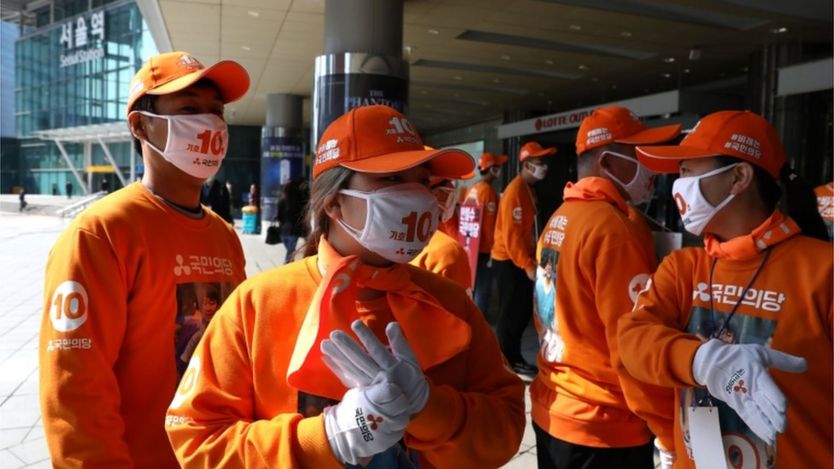
Health officials controlled the spiralling number of cases in February and March quickly and effectively by aggressively tracing and testing infected patients. The infection peaked in February when around 900 people a day were infected.
Now the number of new cases each day is under 50 and more than 7,000 people have recovered from the illness.
It has given President Moon Jae-in's embattled Democratic Party a boost. His opponents in the United Future Party give credit to the thousands of health professionals on the frontline.
There are fears that holding an election could trigger a second wave of infections across the country.
But for now, South Korea is once again determined to prove what is possible during this pandemic.